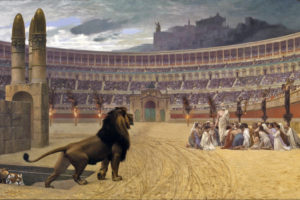Indian Christian scholar Vishal Mangalwadi wrote a book entitled The Book that Made Your World (Thomas Nelson, 2011). Its subtitles reads: How the Bible created the soul of Western civilization. In this book Mangalwadi shows among other things how Christianity alone truly opens the human mind. The popular secular myth today is that Christianity closes the mind; that it affords us a convenient escape from reason. Nothing could be further from the truth. Mangalwadi echoes what Francis Schaeffer stated decades ago: Not to hold to a sound Biblical worldview is to seek an escape from reason.
Mangalwadi writes somewhere: “It is impossible to oppress a people forever who know their Bible”. Far from being opiate to the masses, the Gospel enlightens the mind and liberates the spirit. He asks in chapter 6: “What made the West a thinking civilization?” and then answerers unequivocally: “The scientific, technological, military and economic success of the West came from the fact it became a thinking civilization”. But how did the West become so? Mangalwadi proves convincingly that that was not the fruit of ancient Greek philosophy, much less of the so-called Enlightenment, but of Christianity’s worldview, and above all its view of God.
The Eternal Logos vs. fallen humanity’s ‘wisdom’ through the ages
The Apostle John begins his Gospel proclaiming: “In the beginning was the Word (the Logos) and the Word was with God, and the Word was God”. Behind everything created stands an intelligent, infinite, personal, all-powerful Divine Being, who created all things by His Word (i.e. his wisdom and power). But this God did not remain aloof from us. He came to us as the Word and lived among us. Jesus once said to his disciples in John 8: “You shall know the truth and the truth shall set you free”… when you truly know and obey me. In his high-priestly prayer, he said to his Father: “This is eternal life, that they know you…” (John 17). And in his hearing before Pilate, he testified: “For this purpose was I born, and for this purpose have I come into the world, to bear witness to the truth” (John 18:37).
The Eastern worldview does not promote thinking and rational truth but systematically undermines the same. The Buddha once described the human intellect as the source of ignorance, and Hinduism seeks to replace thinking with meditation, i.e., emptying the mind! That is not the healthy meditation of the 1st Psalm mind you, but the kind of meditation that was popularized in the West as Transcendental Meditation (TM). A graduate of Mangalwadi’s alma mater at Allahabad University, the Maharishi Mahesh Yogi, popularized TM in the West, teaching it as a mechanical way to salvation. The mind must not be filled but emptied (by endlessly repeating some sounds), because the root of our existence is not logos (intelligence) but Avidhya (ignorance).
The Buddhists have printed many books long before Gutenberg invented his printing press, but these books were never meant to impart knowledge. And the Greeks, who championed the idea of logos (at least until Socrates), later lost their way and abandoned it, when popular philosophers in Athens began abusing logos (logic and rhetoric) for manipulating the people. Hence the Greek skeptics arrived, with their suspicion of all logic, becoming the harbingers of the closing of the Athenian Academy in 529.
It took the works of the Alexandrian Jew Philo (25 BC-AD 50), and especially Christian thinkers like St Augustine (354-430) and Boethius (480-524) to keep the force of logic alive through the Middle Ages. Mangalwadi writes: “While Asian monks were altering their rational consciousness through meditation, drugs, and physical and sexual (yoga) exercises, Augustine’s works set the rigorous tone of philosophical studies that have characterized the last fifteen hundred years of religious education in Christendom”. So impressed was Augustine with the valid rules of logic, that he believed it could not have been formulated by human beings.
As the medieval times slowly lingered on, the powerful elite of the church, in seeking to prevent its laypeople from knowing the truth, kept the Bible chained to the convent lectern. That Bible, the Latin Vulgate, was written in (the once common language) of Late Antiquity. But by the High Middle Ages a Bible in Latin became altogether inaccessible to most of the European peoples, even if they could have access to the Bible in a convent. So the Bible was a closed book two times over, and that only brought degeneration and decay, and with it darkness and despair.
But then came countless efforts to reform the church and to put the Bible back in the hands of the people. For centuries these efforts were ruthlessly suppressed. Thousands of Bibles, as well as many of its readers and translators, were put to flames. Why (and this is crucial to grasp)? Because the elites feared a mass awakening of the European mind! For they knew: Once the laypeople could read the Bible, no priest or cardinal would sleep in peace, not to mention the king. That’s why a burning Tyndale could pray so passionately on the stake in Vilvoorde, Belgium in 1535: “O God open the eyes of England’s king”
The Scottish economist Adam Smith (1723–1790) once wrote: “Prosperity is not simply the result of hard work, but of hard work combined with much thought”. So once the Bible broke loose upon the European mind, prosperity was a matter of time. Countries that allowed the Bible to be read, preached and printed reaped the abundant economic benefits as time passed. This was also manifestly shown in the relative disparity of wealth between northern and southern European nations until today.
How Christianity gave us our modern languages
Mangalwadi goes on to show at great lengths how Christianity, through its missionary endeavor in particular, greatly benefitted education the world over. In fact, many languages in the world would not have been linguistically established had it not been for the painstaking labours of missionaries and the effect of Bible translations upon these people groups. He writes: “Bible translators and missionaries did not merely give me my mother tongue, Hindi. Every living literary language in India is a testimony to their labour”. Isn’t that amazing?
Why so? Christianity by its very definition believes that one is saved and sanctified through knowing the God of the Gospel, which admittedly, requires more than head-knowledge, but which has to begin there. That requires the Bible to be translated. But before that can happen, lexicons and grammars must be written, which most languages never possessed before missionaries arrived. What is more: a Bible in your own dialect won’t help you, unless you can read it. Hence new converts and their children must be taught to read.
But who must preach the Gospel to them and to the lost? Godly and gifted men who are properly trained. Augustine (354 – 430 AD) wrote long ago in his De Doctrina Christiana that preachers must be trained not only to master the Biblical languages, but also history, geography, philosophy, rhetoric, logic, etc. Then only will they know what they are talking about when they preach God’s Word. So there you have the seeds of the university that was born in Europe during the Middle Ages. But then came the Reformation in the 1500’s, and later the mission explosion in the 1800’s. Wherever a missionary built his chapel, there a school and a hospital were soon to follow. Incidentally, the word for “school” in Hindi literacy means “the building next to the church”.
And so our author asks: “Why did my university in Allahabad have a chapel attached to it, and not a pagan temple or a mosque?” Why did the millions of “holy” men who came to cleanse themselves at the confluence of two “holy” rivers near his hometown for so many centuries, never establish a school or a university there? Why did it take Christians from America to come and do so?
Why Christian education brings true liberty
But there is even more to this. Christianity – teaching the dignity and value of every human being – seeks the education not only of some but of all, so that all may be saved. It does not only want to teach the illiterate to read but even the blind. It wants to bless, liberate and empower them all for Christ’s Kingdom. But why would the Brahman caste seek the education of the poorest of the poor in India? The Dalits are the lowest caste performing the lowliest and filthiest chores for upper-classes. Educating them means losing their slavish servitude. And why do Boko Aram not want the girls of Nigeria ever to go to school? For the same reason that powerful elites in Canada or America sometimes don’t want the ordinary multitudes to know the truth about something! They are afraid that it will empower them. So the golden rule for an autocrat is: Never educate your subjects, if you want to sleep in peace. Therefore ignorance of the truth is the true opiate for the masses.
British Prime Minister Margaret Thatcher said back in 1988: “We were a nation whose ideals were founded on the Bible… The truths of the Judeo-Christian tradition are infinitely precious (and) provide the moral impulse which alone can lead to peace in the true meaning of the word”. That is what we are losing now, and for which we are all paying such a dear price. Which is why Russian president Vladimir Putin warned Western leaders at the Valdai Forum in 2013: “We can see how many of the Euro-Atlantic countries are rejecting their historic roots, including the Christian values that constitute the very basics of Western civilization…”
The Hebrew prophet Jeremiah once asked (see Jer. 2): “Can it be that a people would forsake the living God, for what is no god?” But that is exactly what did happen in his day, and what is happening now in the West: “My people have forsaken the fountain of living waters for cisterns that can hold no water… but what will they do in the end?”
Christianity and its deep-rooted optimism
Mangalwadi writes so beautifully that Christianity has a deep-rooted optimism. It alone among all the systems and religions of the world teaches us to sing: “Joy to the World”! That is ultimately what is at stake. For when the sun has finally set on the West, where will our help and our joy come from?
The West, in turning its back on Christianity, and by embracing the anti-rational and irrational worldviews of a fallen humanity, will pay a dear price. This can be illustrated by comparing the legacy two musicians who lost their parents at age nine, the first through a divorce and the second through death.
Both these men were made in God’s image and were extremely gifted. Kurt Cobain (1967-1994), lead singer of the rock band Nirvana – struggling with the loss of a parental divorce – became heavily influenced by Buddhism. He believed what he sang, that life is an illusion, and one day decided to blow himself into smithereens with a shotgun somewhere in Seattle. The hardcore “rebels without a cause” who followed in his wake, still struggle to recover from the sad legacy his nihilistic music left behind. The rates of suicide are only rising.
Johann Sebastian Bach (1685-1750) – inspired by the God of Martin Luther – was taken into the home of his older brother when his parents died. He ended up composing some of the most awe-inspiring music that the world has ever heard, filling the minds of listeners for centuries with the wonder and glory of God. Have you ever noticed, it is JS Bach’s God who gives joy to the world, not the god of Nirvana?
That is the huge difference a worldview makes. And that is how crucial it is to know whether your worldview closes or opens your mind. But what will happen, when we have lost our ability to think, living only by our base passions and instincts, and following whatever we are being told?








